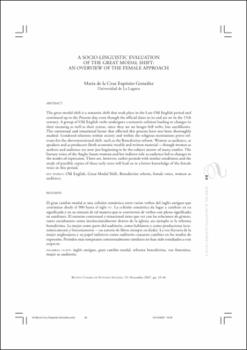A Socio-linguistic Evaluation of the Great Modal Shift: an Overview of the Female Approach
Date
2007Abstract
El gran cambio modal es una colisión semántica entre varios verbos del inglés antiguo que continúan desde el 900 hasta el siglo XV. La colisión semántica da lugar a cambios en su significado y en su sintaxis de tal manera que se convierten de verbos con pleno significado en auxiliares. El entorno contextual y situacional tiene que ver con las relaciones de género, tanto socialmente como institucionalmente dentro de la iglesia; un ejemplo es la reforma
benedictina. La mujer como parte del auditorio, como hablantes y como productoras (económicamente y literariamente —su autoría de libros siempre en duda). La voz literaria de la mujer anglosajona y su papel indirecto como auditorio causaron cambios en los modos de expresión. Períodos más tempranos contextualmente similares no han sido estudiados a este respecto. The great modal shift is a semantic drift that took place in the Late Old English period and
continued up to the Present-day, even though the official dates to its end are set in the 15th
century. A group of Old English verbs undergoes a semantic colision leading to changes in
their meaning as well as their syntax, since they are no longer full verbs, but auxililiaries.
The contextual and situational factor that effected this process have not been thoroughly
studied. Gendered relations within society and within the religious institutions prove relevant for the abovementioned shift, such as the Benedictine reform. Women as audience, as
speakers and as producers (both economic wealth and written material —though women as
authors and audience are now just beginning to be the subject matter of many studies. The
literary voice of the Anglo-Saxon woman and her indirect role as audience led to changes in
the modes of expression. There are, however, earlier periods with similar conditions and the
study of possible copies of these early texts will lead us to a better knowledge of the female
voice in this period.





